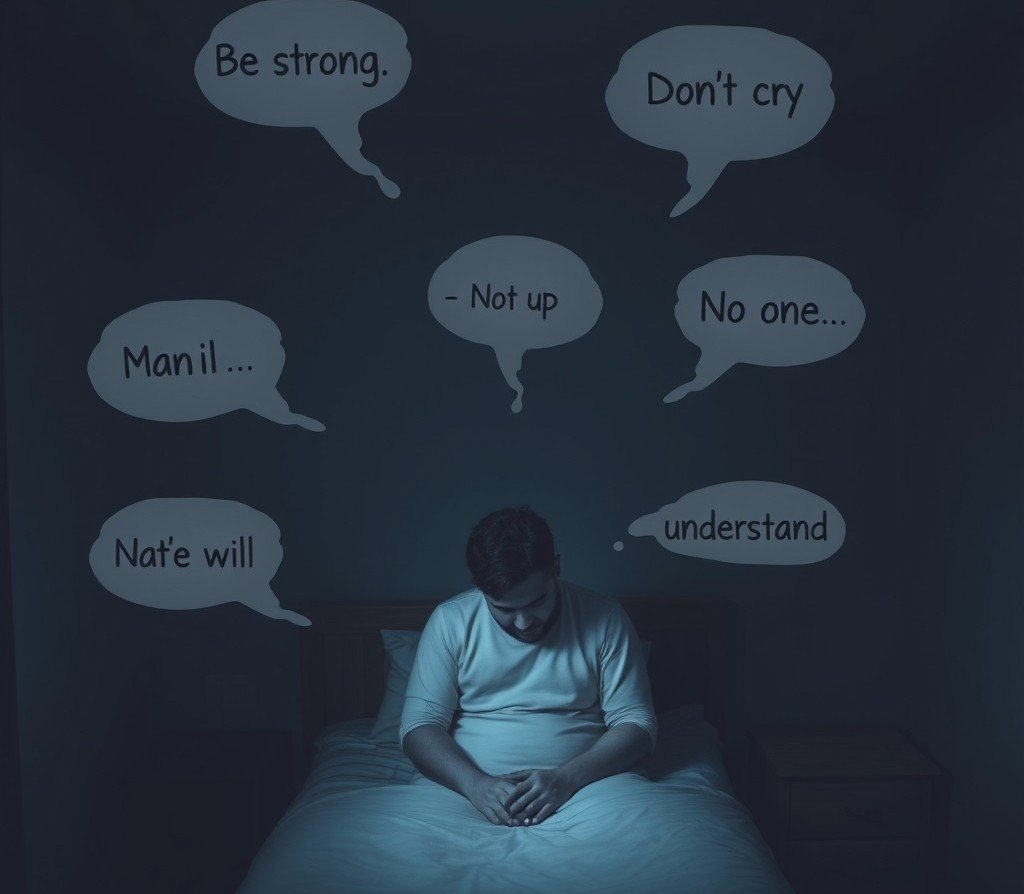Men’s Mental Health Month: 0ne Conversation at a Time
June marks Men’s Mental Health Month, a time to raise awareness and challenge the long-standing silence around male mental well-being. For generations, men have been expected to be emotionally stoic, self-reliant, and invulnerable. These societal expectations have made it difficult for men to speak openly about their mental health.
High suicide rates, rising substance abuse, and untreated depression among men paint a grim picture. Yet change doesn’t have to begin with a revolution—it can start with one simple, honest conversation. Whether it’s a text, a check-in, or a heartfelt talk, these small moments can open the door to healing.
This Men’s Mental Health Month, let’s commit to creating space for those conversations—one voice, one story, one man at a time.
The Hidden Mental Health Struggle Among Men

The Statistics Tell a Story
- Men die by suicide 3 to 4 times more often than women worldwide.
- 1 in 8 men will experience depression or anxiety during their lifetime.
- Only 30–40% of men with mental health issues actively seek help.
- Men are more likely to cope through substance abuse or aggression rather than therapy or dialogue.
These numbers aren’t just statistics—they represent fathers, brothers, partners, coworkers, and friends. And behind each number is often a man who felt he couldn’t talk to anyone about what he was going through.
Why Don’t Men Talk About Mental Health?

1. Cultural Norms and Gender Roles
From a young age, boys are often told to “man up,” “don’t cry,” and “be strong.” Emotional expression is painted as weakness, while stoicism is seen as masculine. These outdated ideals prevent many men from even acknowledging emotional pain, let alone talking about it.
2. Fear of Being Judged
There’s a deeply rooted fear among men that sharing their struggles will make them appear less competent or “weak” in the eyes of others. This fear often keeps them suffering in silence—even when surrounded by people who care.
3. Lack of Accessible or Appealing Resources
Many traditional mental health resources don’t feel relevant or welcoming to men. Some men feel that therapy isn’t “for them” or that no one will understand their experience. Male-centric platforms are helping shift that dynamic—but we still have a long way to go.
One Conversation Can Save a Life

The truth is: talking helps. Whether it’s opening up to a friend, confiding in a therapist, or simply acknowledging that something feels off—these conversations matter.
When men share their mental health experiences, it creates a ripple effect:
- It encourages others to speak up.
- It normalizes emotional vulnerability.
- It chips away at the stigma, one story at a time.
If you’re wondering how to start that conversation, sometimes it’s as simple as:
“Hey, you’ve seemed off lately. Want to talk about anything?”
“I’ve been dealing with some stress too—how are you handling everything?”
The Role of Community: Support Systems Matter

For Friends and Family:
- Be present. Show you care with consistent check-ins.
- Listen more, fix less. Sometimes men just need to be heard, not “fixed.”
- Avoid judgment. Validate feelings instead of minimizing them.
For Workplaces:
- Promote mental health as part of employee wellness programs.
- Encourage open-door policies and allow for mental health days.
- Share resources during Men’s Mental Health Month to boost awareness.
For Society at Large:
- Celebrate male vulnerability in media, education, and storytelling.
- Promote male mental health role models.
- Support organizations working specifically with men.
Redefining What It Means to Be a Man

The stereotype that “real men don’t cry” is not only outdated—it’s harmful. Men feel deeply. They grieve, stress, love, and break down just like anyone else. Strength is not the absence of emotion; it’s the courage to express it.
This month, let’s redefine masculinity to include:
- Empathy
- Self-awareness
- Emotional literacy
- Mutual support
Mental Health Resources Tailored for Men
Here are trusted platforms and organizations doing crucial work in male mental health:
- HeadsUpGuys – Practical support for men dealing with depression.
- Movember – A global movement focused on men’s mental health and suicide prevention.
- Man Therapy – A humorous and relatable approach to serious mental health topics.
- Therapy for Black Men – A directory and community focused on empowering Black men through therapy.
- The Barbershop Project – Uses barbershops as safe spaces for open conversation among men of color.
Tools for Healing: Where to Begin

Even if you’re not ready to talk to someone else yet, there are ways to start healing:
- Journaling: Write out thoughts to clarify what you’re feeling.
- Meditation and Breathwork: Proven to reduce anxiety and emotional tension.
- Podcasts and Books: Listening to other men share can make you feel less alone.
- Fitness and Nutrition: Regular exercise helps regulate mood and improve sleep.
- Limit Alcohol and Drugs: These are short-term masks that often worsen long-term problems.
Stories that Inspire: Men Speaking Out
Increasingly, public figures are leading the charge toward emotional honesty:
- Prince Harry has spoken openly about therapy and trauma following his mother’s death.
- Michael Phelps has shared his struggle with depression and suicidal thoughts—even at the height of his success.
- Kevin Love, an NBA player, wrote a powerful essay titled “Everyone Is Going Through Something,” urging men to seek help.
These stories don’t just inspire—they give permission for others to speak up too.
How to Start a Mental Health Conversation With a Man

Men often don’t open up unless they feel it’s safe. Here’s how you can help create that safety:
- Be casual, not confrontational: Try a walk or a car ride rather than sitting face-to-face.
- Ask twice: Men often say “I’m fine” on the first ask. Try again gently.
- Share your own experience: Being vulnerable first can make it easier for them to open up.
- Respect their pace: Some men need time before they’re ready to talk deeply.
Conclusion:
Every movement begins with a single step. And in the case of men’s mental health, it starts with a single conversation.
Whether you’re a man carrying something heavy, or someone who cares about one—this month is a reminder that no one should suffer in silence. Talking doesn’t make you less of a man. It makes you more human.
FAQ’s
1. Is there a mental health month for men?
Yes, men’s mental health is highlighted during Movember. It focuses on mental health, suicide prevention, and prostate/testicular cancer.
2. Is it Pride Month or Men’s Mental Health Month?
June is Pride Month, celebrating LGBTQ+ rights and identity. Men’s Mental Health Month is often associated with Movember in November.
3. Is men’s health month in June or November?
Men’s Health Month is officially recognized in June in the U.S. But Movember (November) brings global focus on men’s health, especially mental health.
4. Is June Men’s Health Month 2025?
Yes, June 2025 is Men’s Health Month in the United States. It raises awareness of preventable health issues in men and boys.
5. Is men’s mental health month overlooked?
Yes, many believe men’s mental health is often overlooked and under-discussed. Stigma and silence around male vulnerability contribute to this issue.
6. What date is Men’s Mental Health Week?
Men’s Mental Health Week is typically the week leading up to Father’s Day—June 9–15 in 2025. It promotes mental well-being and early intervention.


